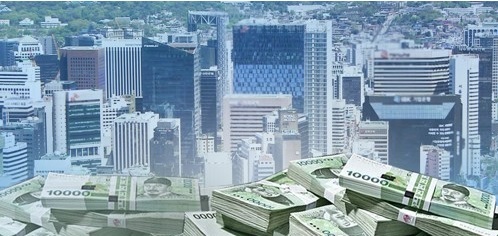Sales growth of Korean firms slows, market share in China declines
Samsung, LG, Hyundai ranked among top 50 firms for 35 straight years
By Shin Ji-hyePublished : Feb. 18, 2020 - 14:42

Only eight companies, including Samsung Electronics, LG Electronics and Hyundai Motor, have been ranked among Korea’s top 50 listed companies in revenue for 35 consecutive years. Seventy percent of the largest companies were found to have lost their ranks or changed ownership, data showed Tuesday.
Local research firm Sustainable Growth Institute surveyed sales data of the nation’s 50 largest companies by revenue between 1984 and 2018. The surveyed companies are in the manufacturing and service sectors, barring those in the financial industry.
Since 1984, eight companies have been listed in the top 50 without changing ownership. They are Samsung Electronics, Samsung C&T, LG Electronics, LG Chem, Hyundai Motor, Hyundai Engineering & Construction, Korean Air and Daelim Industrial.
In 1984, Samsung Electronics’ sales were 1.3 trillion won ($1.09 billion), but they grew more than 120 times to 170.3 trillion won in 2018. Hyundai Motor’s sales rose more than 60 times to 43.1 trillion won during the period.
According to the survey, the combined revenue of the top 50 domestic companies rose from 34 trillion won in 1984 to 872 trillion won in 2018.
However, sales growth slowed following an initial peak of 863 trillion won in 2013. The combined figure fell to 845 trillion won in 2014, 795 trillion won in 2015 and 772 trillion won in 2016. It was not until 2018 that the figure rebounded higher than sales in 2013, but then by only 1 percent. This is a strong sign that sales growth for large Korean companies is slowing, according to the institute.
“In Korea, where the economy tends to move around large companies, external growth has slowed down or backtracked since 2010. With this industrial paradigm, it is not easy to expect a boom in sales like the 1980s and 1990s,” said SGI CEO Shin Kyung-soo.
Korean companies’ share in the world’s fastest-growing Chinese market has also been on a steady decline in recent years, according to the Federation of Korean Industries, which represents the nation’s large businesses.
The FKI analyzed market share changes in the top four countries -- South Korea, Japan, the US and Germany -- in China’s overall import market between 2010 and 2019 using UN Comtrade trade statistics. It showed Korea continued to fall from a peak of 10.4 percent in 2015 to 8.5 percent in 2019.
Looking at the trend of market share in China’s import market for in-country consumption, Korea fell to 5.4 percent in 2018 after hitting a peak of 7.9 percent in 2016. The Association of Southeast Asian Nations bloc, which has established itself as a global production base, saw its market share in China rise from 10.2 percent in 2011 to 12.1 percent in 2018.
As for sales in proportion to investments made by Korean companies in China, the figure peaked at 7.3 times in 2013 and fell to 4.5 times in 2017. The operating profit ratio also fell from 4.9 percent in 2013 to 3.8 percent in 2017.
The market shares in the electronics and automobile sectors have fallen sharply due to the rapid fall in unit prices of semiconductors and sluggish sales of smartphones and passenger cars until last year. The share of domestic car brands fell from 9 percent in 2014 to 4.8 percent in 2019, while Samsung’s smartphone share declined from 19 percent in the first quarter of 2014 to 1 percent in the same quarter of 2019.
Uhm Chi-sung, head of the FKI’s international cooperation division, said, “China entered the era of per capita gross domestic product of $10,000 at the end of last year and the Chinese government is also expanding its market opening. Korean companies must overcome their current difficulties and take advantage of it as an opportunity.”
“It is necessary to reestablish mid- to long-term strategies by benchmarking companies that are doing well in the Chinese market and to consider diversifying the global supply chain in the wake of the coronavirus incident.”
By Shin Ji-hye (shinjh@heraldcorp.com)












![[Today’s K-pop] BTS pop-up event to come to Seoul](http://res.heraldm.com/phpwas/restmb_idxmake.php?idx=644&simg=/content/image/2024/04/17/20240417050734_0.jpg&u=)





![[KH Explains] Hyundai's full hybrid edge to pay off amid slow transition to pure EVs](http://res.heraldm.com/phpwas/restmb_idxmake.php?idx=652&simg=/content/image/2024/04/18/20240418050645_0.jpg&u=20240419100350)

![[Today’s K-pop] Zico drops snippet of collaboration with Jennie](http://res.heraldm.com/phpwas/restmb_idxmake.php?idx=642&simg=/content/image/2024/04/18/20240418050702_0.jpg&u=)